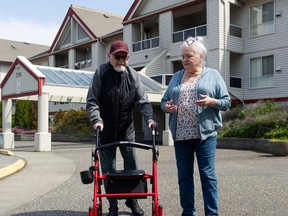Roughly one-in-10 households that rent in B.C. say they were forced to move during a recent five-year period, a significantly higher eviction rate than any other region in Canada, says a new University of B.C. report.
Business
‘I have nowhere to go’: B.C. is Canada’s eviction capital, new research shows

This is in sharp contrast to previous research that showed, between 2004 and 2017, that evictions in B.C. were more commonly due to something the tenant had done, such as failing to pay rent, and very infrequently for reasons such as landlords wanting to move into their units.

“Evictions have long been viewed as a response to ‘bad tenants,’ ” says the report, Estimating No-Fault Evictions in Canada: Understanding B.C.’s Disproportionate Eviction Rate in the 2021 Canadian Housing Survey.
But more recently, attention has shifted to evictions being driven by the “financialization” of the housing stock, defined as “the increasing treatment of housing as an investment asset, rather than as a social good,” the report says.
“While these (no-fault evictions) can involve evictions for genuine personal use, they are often financially motivated, caused by the landlord’s belief that they can sell the property for a profit or increase the rent if they evict the tenant or renovate the unit,” says the new report, co-authored by researcher Silas Xuereb and Craig Jones, associate director of UBC’s Housing Research Collaborative.
Jones said his research team didn’t expect to uncover the fact that such a large majority of evictions in B.C. over the last five years would involve no fault by the tenant, but he cautioned that he can’t say how many may have been done in bad faith.
The data Jones used in the report comes from Statistics Canada’s Canadian Housing Survey, which for the first time in 2021 asked respondents for the reasons their landlords asked them to move. It’s the first tangible glimpse into the scope of the reasons behind evictions across the country; this data doesn’t exist at the provincial level because most governments, including in B.C., only track the evictions that tenants challenge, not the overall number that take place.
A new survey of 443 evicted tenants by Vancouver-based non-profit First United, published Saturday in The Vancouver Sun, found only one-third of those facing evictions filed complaints with B.C.’s Residential Tenancy Branch (RTB), the government agency responsible for dispute resolution services for landlords and tenants. First United’s Eviction Mapping project also found no-fault evictions were far more common than cases in which tenants hadn’t paid the rent, caused damage or were evicted for bad behaviour.
Jones’s report estimated that, based on the federal data, 253,000 to 331,000 renter households containing 531,000 to 770,000 renters were evicted between April 2016 and April 2021. A B.C. breakdown wasn’t provided, but this province would represent a significant portion of these numbers as it leads the nation in evictions.
Linda de Gonzalez is one of the unlucky ones facing the loss of her longtime home.
The Surrey resident received a letter last month from the landlord of her building, Winsome Place, where she has rented her modest, two-bedroom apartment for two decades. The 70-year-old pensioner was asked to agree to start paying $1,450 on June 1, a jump of 43 per cent from her current monthly rate of $1,014.

“It really was utterly and completely devastating. I literally felt my stomach fall out,” said de Gonzalez, who worries she would never find a replacement apartment within her budget for her and her pet birds. “I just sat on the floor and I cried and I cried and I cried. And I kept thinking what am I going to do? I have nowhere to go.”
Her Newton-area building, home to a mix of seniors and young immigrant families, had always operated like an apartment building. But unbeknownst to de Gonzalez and her neighbours it’s actually strata-titled, meaning each of the 72 suites could be sold separately.
When May 10 arrived, de Gonzalez decided not to sign, saying she had have no money left for groceries after paying her other expenses.
“I decided that if they’re gonna kick me out, then I’ll end up living in my car with my birds in the back seat,” said the retired accounting clerk.

Although provincial law restricts annual rent increases to two per cent, landlords are permitted to raise rents higher than that if they get permission from the RTB or if they get their tenants to agree. Therefore what de Gonzalez’s landlord is trying to do is legal, said Zuzana Modrovic of the non-profit Tenant Resource and Advisory Centre (TRAC), which has been helping the Winsome Place tenants.
It’s a difficult situation for tenants, Modrovic said, because even if they agree to pay more rent, there is nothing stopping landlords from raising it again or selling the units.
“B.C.’s housing is based so much on (private) landlords providing a sporadic mosaic of different types of tenancies, and there’s a bunch of inconsistencies on how different landlords apply the rules,” said Samarakoone, who is also chair of the Green Party of Vancouver.
“We’ve moved so far from government-provided housing, and we’ve gone so much into this system of private landlords, and we’re not providing the adequate safety net.
Even when landlords follow all the rules, it’s not realistic to expect the private sector to provide affordable housing if it means they’re losing money due to external pressures such as variable interest rates.
“Those pressures will compel them to make decisions, and some decisions are not in bad faith, they’re just doing it so they’re not going in to the red,” Samarakoone said. “If it’s private owners, how can we expect there to be affordable housing? Everybody’s trying to make a profit.”

Jones’s report confirmed evictions were more common with private landlords, and far less common in co-ops and non-market housing. B.C. needs more purpose-built rental housing — something that governments have embraced in recent years, but there is a lot of catching up to do after decades of inaction, Jones said.
“I really feel like we have a home here with some real security of tenure,” Jones said.
But it takes time to construct new buildings, and there are changes that could be made at the RTB in the short-term to help tenants during this housing crisis, said First United lawyer Sarah Marsden.
This includes requiring landlords to apply to end tenancies, similar to the law in Ontario, which would make the RTB aware of all formal eviction attempts; more flexibility with the rule allowing eviction if the rent is more than five days late, especially if the amount owing is small; and if a tenant loses a dispute before the RTB, extending the time they must vacate the unit beyond two days, because this short period deters many from pursuing disputes, said Marsden.
“Landlord’s use” was identified as a “concerning trend” in Jones’s report, and both Marsden and Modrovic said it could be clipped if government took the same action as it did with renovictions: requiring the landlord to file paperwork to prove which relative is moving in and why they need to live there.
David Hutniak of the industry group Landlord B.C. rejects the idea that renovictions have been replaced by landlords ending tenancies for personal use, arguing it’s an apples-to-oranges comparison.
Renovictions “were occurring in purpose-built rental” buildings, he argued, while ending tenancies for personal use mainly takes place in the secondary market, when owners want to reclaim their basement suites or condos.
He added landlords caught lying about ending tenancies for personal use face “harsh” new penalties of reimbursing displaced tenants with up to 12 months’ rent.
That may be true, Modrovic said, but if the landlord can hike the rent high enough for a new tenant, then it wouldn’t take long to make up for that financial penalty.
It remains “incredibly difficult” for people to find rental housing they can afford in the current rental market, Modrovic said.
However, they added, “If there’s light at the end of the tunnel, it does seem that the government is at least somewhat receptive to what advocates say the problems are. And we are hopeful that we will see some change to what we see as the biggest problems.”

Business
Japan’s SoftBank returns to profit after gains at Vision Fund and other investments

TOKYO (AP) — Japanese technology group SoftBank swung back to profitability in the July-September quarter, boosted by positive results in its Vision Fund investments.
Tokyo-based SoftBank Group Corp. reported Tuesday a fiscal second quarter profit of nearly 1.18 trillion yen ($7.7 billion), compared with a 931 billion yen loss in the year-earlier period.
Quarterly sales edged up about 6% to nearly 1.77 trillion yen ($11.5 billion).
SoftBank credited income from royalties and licensing related to its holdings in Arm, a computer chip-designing company, whose business spans smartphones, data centers, networking equipment, automotive, consumer electronic devices, and AI applications.
The results were also helped by the absence of losses related to SoftBank’s investment in office-space sharing venture WeWork, which hit the previous fiscal year.
WeWork, which filed for Chapter 11 bankruptcy protection in 2023, emerged from Chapter 11 in June.
SoftBank has benefitted in recent months from rising share prices in some investment, such as U.S.-based e-commerce company Coupang, Chinese mobility provider DiDi Global and Bytedance, the Chinese developer of TikTok.
SoftBank’s financial results tend to swing wildly, partly because of its sprawling investment portfolio that includes search engine Yahoo, Chinese retailer Alibaba, and artificial intelligence company Nvidia.
SoftBank makes investments in a variety of companies that it groups together in a series of Vision Funds.
The company’s founder, Masayoshi Son, is a pioneer in technology investment in Japan. SoftBank Group does not give earnings forecasts.
___
Yuri Kageyama is on X:
The Canadian Press. All rights reserved.
Business
Trump campaign promises unlikely to harm entrepreneurship: Shopify CFO

Shopify Inc. executives brushed off concerns that incoming U.S. President Donald Trump will be a major detriment to many of the company’s merchants.
“There’s nothing in what we’ve heard from Trump, nor would there have been anything from (Democratic candidate) Kamala (Harris), which we think impacts the overall state of new business formation and entrepreneurship,” Shopify’s chief financial officer Jeff Hoffmeister told analysts on a call Tuesday.
“We still feel really good about all the merchants out there, all the entrepreneurs that want to start new businesses and that’s obviously not going to change with the administration.”
Hoffmeister’s comments come a week after Trump, a Republican businessman, trounced Harris in an election that will soon return him to the Oval Office.
On the campaign trail, he threatened to impose tariffs of 60 per cent on imports from China and roughly 10 per cent to 20 per cent on goods from all other countries.
If the president-elect makes good on the promise, many worry the cost of operating will soar for companies, including customers of Shopify, which sells e-commerce software to small businesses but also brands as big as Kylie Cosmetics and Victoria’s Secret.
These merchants may feel they have no choice but to pass on the increases to customers, perhaps sparking more inflation.
If Trump’s tariffs do come to fruition, Shopify’s president Harley Finkelstein pointed out China is “not a huge area” for Shopify.
However, “we can’t anticipate what every presidential administration is going to do,” he cautioned.
He likened the uncertainty facing the business community to the COVID-19 pandemic where Shopify had to help companies migrate online.
“Our job is no matter what comes the way of our merchants, we provide them with tools and service and support for them to navigate it really well,” he said.
Finkelstein was questioned about the forthcoming U.S. leadership change on a call meant to delve into Shopify’s latest earnings, which sent shares soaring 27 per cent to $158.63 shortly after Tuesday’s market open.
The Ottawa-based company, which keeps its books in U.S. dollars, reported US$828 million in net income for its third quarter, up from US$718 million in the same quarter last year, as its revenue rose 26 per cent.
Revenue for the period ended Sept. 30 totalled US$2.16 billion, up from US$1.71 billion a year earlier.
Subscription solutions revenue reached US$610 million, up from US$486 million in the same quarter last year.
Merchant solutions revenue amounted to US$1.55 billion, up from US$1.23 billion.
Shopify’s net income excluding the impact of equity investments totalled US$344 million for the quarter, up from US$173 million in the same quarter last year.
Daniel Chan, a TD Cowen analyst, said the results show Shopify has a leadership position in the e-commerce world and “a continued ability to gain market share.”
In its outlook for its fourth quarter of 2024, the company said it expects revenue to grow at a mid-to-high-twenties percentage rate on a year-over-year basis.
“Q4 guidance suggests Shopify will finish the year strong, with better-than-expected revenue growth and operating margin,” Chan pointed out in a note to investors.
This report by The Canadian Press was first published Nov. 12, 2024.
Companies in this story: (TSX:SHOP)
The Canadian Press. All rights reserved.
Business
RioCan cuts nearly 10 per cent staff in efficiency push as condo market slows

TORONTO – RioCan Real Estate Investment Trust says it has cut almost 10 per cent of its staff as it deals with a slowdown in the condo market and overall pushes for greater efficiency.
The company says the cuts, which amount to around 60 employees based on its last annual filing, will mean about $9 million in restructuring charges and should translate to about $8 million in annualized cash savings.
The job cuts come as RioCan and others scale back condo development plans as the market softens, but chief executive Jonathan Gitlin says the reductions were from a companywide efficiency effort.
RioCan says it doesn’t plan to start any new construction of mixed-use properties this year and well into 2025 as it adjusts to the shifting market demand.
The company reported a net income of $96.9 million in the third quarter, up from a loss of $73.5 million last year, as it saw a $159 million boost from a favourable change in the fair value of investment properties.
RioCan reported what it says is a record-breaking 97.8 per cent occupancy rate in the quarter including retail committed occupancy of 98.6 per cent.
This report by The Canadian Press was first published Nov. 12, 2024.
Companies in this story: (TSX:REI.UN)
The Canadian Press. All rights reserved.
-

 News8 hours ago
News8 hours agoVirginia Democrats advance efforts to protect abortion, voting rights, marriage equality
-

 News8 hours ago
News8 hours agoAbbotsford, B.C., man pleads guilty to trafficking in black bear paws
-

 News8 hours ago
News8 hours agoIn Cyprus, Ukrainians learn how to dispose of landmines that kill and maim hundreds
-

 News8 hours ago
News8 hours agoTrump chooses anti-vaccine activist Robert F. Kennedy Jr. as health secretary
-

 News8 hours ago
News8 hours agoOnly 8 monkeys remain free after more than a week outside a South Carolina compound
-

 News8 hours ago
News8 hours agoVancouver Canucks winger Joshua set for season debut after cancer treatment
-

 News15 hours ago
News15 hours agoEnergy experts think Donald Trump will make tariff exemptions for Canadian oil
-

 News8 hours ago
News8 hours agoAI could help scale humanitarian responses. But it could also have big downsides


















